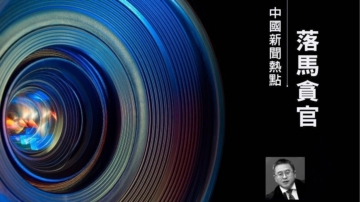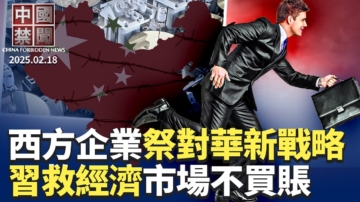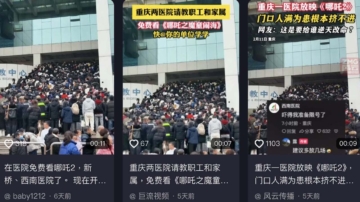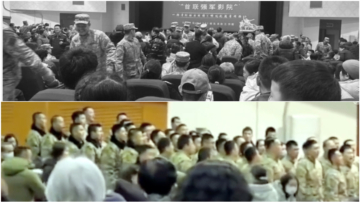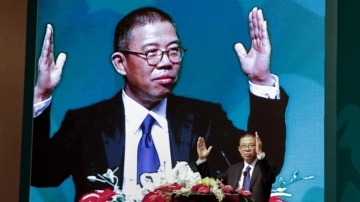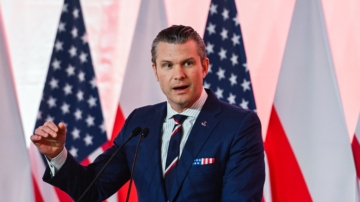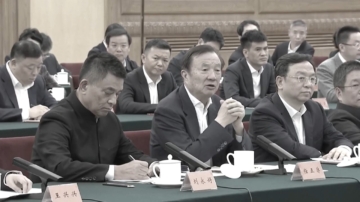【新唐人2013年07月24日訊】近期,一份《中共中央機關財政決算報告》震驚了各界。報告顯示,僅2012年,大陸80多個中央機關就消費了9200億元,超出預算2200億元。民眾紛紛追問,這麼多錢究竟花在了甚麼地方?專家指出,預算、決算相差如此之大,證明中共當局財政預算編製如同兒戲,又因為花的是民眾的錢,因此肆意揮霍,才造成超支過度。
7月18號,中共中央80多個部門集中公開2012年度決算,包括「三公」經費、行政經費等數據,絕大多數部門決算遠超預算幅度。
所謂部門預算,就是看未來一年「預計花多少錢,怎麼花」,決算則是「實際上花了多少錢,怎麼花的」。專家指出,預算和決算差別不應該太大,否則就說明花錢隨意性太大,這樣的預算就沒有太大意義。
美國南卡羅萊納大學艾肯商學院教授謝田:「因為中國共產黨向來是高於法律的,各級政府都是這樣,他們實際上都沒有真正的按照預算來做這預演,它不需要為老百姓負責,也沒有人去監督它的權力,它實質上,是把公款消費這些支出、吃喝、旅行這些『三公消費』算作他們作為官員福利的一部分,它這個預算實際上只能過過場,走走形式而已。」
從決算總額看,花費排在前三名的分別是教育部、稅務總局和前衛生部,其中教育部花費近2600億元,超出預算729.16億元。按照公布的信息顯示:以教育部30萬在職人員和近20萬的離退休人員來計算,去年教育部的人頭費平均每人高達50萬元以上。
美國紐約城市大學政治學教授夏明:「最根本的問題在於,中國的『錢袋子』權力完全由黨和國——毫無限制、毫無監督的,一方面掠奪性的在使用﹔第二方面是為特權利益在使用﹔第三,整個使用過程處於黑箱操作。因為它沒有監督,所以就沒有責任,在這種情況下,它也沒有節約概念。」
6月底審計署發佈的數據顯示,104個中央部門本級有396.4億元結餘結轉資金,其中22個部門項目支出結餘結轉超過當年預算的35%,最高達189%。專家感慨:如果這些錢能投入到民生項目,可以解決多少實際問題!
根據一位曾擔任過教育局局長的人大代表統計,每年只需1800億就可以讓全中國的義務教育真正免費,800億就可以讓農村中小學學雜費全免。而全世界193個國家,有170個國家的義務教育免費,其中包括印度。但中共當局卻以「教育經費緊張」,成為了世界上少數幾個義務教育收費的國家,這不能不說是一個諷刺。
夏明:「如果說西方國家是『民有、民治、民享』的政府的話,那麼中國就變成了『官有、官治和官享』的政府。」
在中國俗稱「因公出國」、「公務車」和「公款招待」為「三公消費」。儘管中共的「三公」經費支出一直備受詬病,但仍逐年遞增。
在極大的民怨下,中共領導人習近平出臺了一系列控制「三公」消費的新政。於是,在去年度的中央決算報告上,「三公」經費支出比預算減少了5.59億元。
中國的《千龍網》分析指出,中共官員和政府部門不過是將「三公」消費由明轉暗,才出現「三公」費用明顯降低,但實際上經費總量不降反增。因為這些錢在賬面上都變成了「其他收支」,有些國有機關和地方政府的「其他開支」甚至佔總支出的40%。可見中共媒體宣傳的所謂「三公消費」明顯降低,不過是掩耳盜鈴的把戲罷了。
採訪/ 常春 編輯/張天宇 後製/蕭雨
920 billion a year consumed, where did the money actually go?
Recently, a Chinese Communist Party (CCP) Central Committee Financial Settlement Report shocked the community. It shows that within 2012, 80+ central departments consumed 920 billion yuan, exceeding the budget of 220 billion yuan. People question where exactly that much money was spent.
Experts said that the huge gap between the budget and the actual figure proves financial budgeting is meaningless because it is the public's money, so profligate spending has caused excessive cost overruns.
On July 18th, more than 80 central departments of the Chinese Communist Party (CCP) published the 2012 annual accounts, including the "three public consumptions," administrative expenses. The majority of the accounts were far over budget.
The purpose of the so-called departmental budgeting is to look at how much money is expected to be spent in the coming year and where it will be spent. Experts say there shouldn't be a large gap between the budget and final account. If there is random spending, the budget would not make much sense.
Aiken School of Business (USC) Professor Xie Tian: "The Party is always above the law, so are its governments at all levels. They didn't actually perform according to the budget. It is irresponsible towards the people, no one supervises its power. Essentially, officials count these expenditures, food and drink, travel (three public consumptions) as part of their benefits, so the budget is just for a show and has no actually meaning."
。
The top three of the total accounts are respectively, the Ministry of Education, State Administration of Taxation and the former Ministry of Health; the Ministry of Education spent nearly 260 billion yuan, which was 72.916 billion yuan over budget. As released, the Ministry of Education has 300,000 employees and nearly 200,000 retirees, the average for each person was up to 50 million yuan last year.
NYCU political science professor Xia Ming: "The key point is that the spending power in China is entirely controlled by the party and the regime without restrictions or supervision, predatorily, for privileged interest, in black-box fashion. There is no monitoring, no obligation, so they spend recklessly."
The Audit Commission released data in June showing that 104 central departments with a 39.64 billion yuan surplus of carry-over funds, of which 22 departments expenditure balance carried over 35% of the year's budget, even up to 189%. Experts feel that if the money can be put into livelihood projects, many practical problems can be solved.
According to a statistic provided by a former deputy of the Education Bureau, 180 billion yuan a year can make compulsory education truly free throughout all of China. 80 billion yuan would allow rural schools to be tuition free in China. There are 193 countries in the world, 170 countries have reached free compulsory education, including India. However, Chinese authorities claim with "education funding tension," it became one of the countries that charges a fee for compulsory education. Isn't this a satire!
Xia Ming: "If western governments are 'of the people, by the people, for the people', then China would be 'of the officials, by the officials and for the officials.'"
The cost of overseas travel, receptions and official cars are called the "three public consumptions" in China. Although the three public consumptions have long been criticized, spending in that area is still increasing every year.
With great resentment, the Chinese leaders Xi Jinping introduced a series of control of the “three public consumptions." Thus, in last year's central accounts report, the "three public consumptions” budget was reduced by 559 million yuan.
Qianlong Network experts pointed out that Chinese officials and government departmental spending faded to black. This is why it appears the costs were significantly reduced. Actually, the amount increased rather than reduced, because the money on the books have become other expenses. The other expenses can be 40% of total expenditure in some state or local departments. It tells us that the significantly reduced “three public consumptions” propaganda by the CCP media` is a trick to fool the public.
7月18號,中共中央80多個部門集中公開2012年度決算,包括「三公」經費、行政經費等數據,絕大多數部門決算遠超預算幅度。
所謂部門預算,就是看未來一年「預計花多少錢,怎麼花」,決算則是「實際上花了多少錢,怎麼花的」。專家指出,預算和決算差別不應該太大,否則就說明花錢隨意性太大,這樣的預算就沒有太大意義。
美國南卡羅萊納大學艾肯商學院教授謝田:「因為中國共產黨向來是高於法律的,各級政府都是這樣,他們實際上都沒有真正的按照預算來做這預演,它不需要為老百姓負責,也沒有人去監督它的權力,它實質上,是把公款消費這些支出、吃喝、旅行這些『三公消費』算作他們作為官員福利的一部分,它這個預算實際上只能過過場,走走形式而已。」
從決算總額看,花費排在前三名的分別是教育部、稅務總局和前衛生部,其中教育部花費近2600億元,超出預算729.16億元。按照公布的信息顯示:以教育部30萬在職人員和近20萬的離退休人員來計算,去年教育部的人頭費平均每人高達50萬元以上。
美國紐約城市大學政治學教授夏明:「最根本的問題在於,中國的『錢袋子』權力完全由黨和國——毫無限制、毫無監督的,一方面掠奪性的在使用﹔第二方面是為特權利益在使用﹔第三,整個使用過程處於黑箱操作。因為它沒有監督,所以就沒有責任,在這種情況下,它也沒有節約概念。」
6月底審計署發佈的數據顯示,104個中央部門本級有396.4億元結餘結轉資金,其中22個部門項目支出結餘結轉超過當年預算的35%,最高達189%。專家感慨:如果這些錢能投入到民生項目,可以解決多少實際問題!
根據一位曾擔任過教育局局長的人大代表統計,每年只需1800億就可以讓全中國的義務教育真正免費,800億就可以讓農村中小學學雜費全免。而全世界193個國家,有170個國家的義務教育免費,其中包括印度。但中共當局卻以「教育經費緊張」,成為了世界上少數幾個義務教育收費的國家,這不能不說是一個諷刺。
夏明:「如果說西方國家是『民有、民治、民享』的政府的話,那麼中國就變成了『官有、官治和官享』的政府。」
在中國俗稱「因公出國」、「公務車」和「公款招待」為「三公消費」。儘管中共的「三公」經費支出一直備受詬病,但仍逐年遞增。
在極大的民怨下,中共領導人習近平出臺了一系列控制「三公」消費的新政。於是,在去年度的中央決算報告上,「三公」經費支出比預算減少了5.59億元。
中國的《千龍網》分析指出,中共官員和政府部門不過是將「三公」消費由明轉暗,才出現「三公」費用明顯降低,但實際上經費總量不降反增。因為這些錢在賬面上都變成了「其他收支」,有些國有機關和地方政府的「其他開支」甚至佔總支出的40%。可見中共媒體宣傳的所謂「三公消費」明顯降低,不過是掩耳盜鈴的把戲罷了。
採訪/ 常春 編輯/張天宇 後製/蕭雨
920 billion a year consumed, where did the money actually go?
Recently, a Chinese Communist Party (CCP) Central Committee Financial Settlement Report shocked the community. It shows that within 2012, 80+ central departments consumed 920 billion yuan, exceeding the budget of 220 billion yuan. People question where exactly that much money was spent.
Experts said that the huge gap between the budget and the actual figure proves financial budgeting is meaningless because it is the public's money, so profligate spending has caused excessive cost overruns.
On July 18th, more than 80 central departments of the Chinese Communist Party (CCP) published the 2012 annual accounts, including the "three public consumptions," administrative expenses. The majority of the accounts were far over budget.
The purpose of the so-called departmental budgeting is to look at how much money is expected to be spent in the coming year and where it will be spent. Experts say there shouldn't be a large gap between the budget and final account. If there is random spending, the budget would not make much sense.
Aiken School of Business (USC) Professor Xie Tian: "The Party is always above the law, so are its governments at all levels. They didn't actually perform according to the budget. It is irresponsible towards the people, no one supervises its power. Essentially, officials count these expenditures, food and drink, travel (three public consumptions) as part of their benefits, so the budget is just for a show and has no actually meaning."
。
The top three of the total accounts are respectively, the Ministry of Education, State Administration of Taxation and the former Ministry of Health; the Ministry of Education spent nearly 260 billion yuan, which was 72.916 billion yuan over budget. As released, the Ministry of Education has 300,000 employees and nearly 200,000 retirees, the average for each person was up to 50 million yuan last year.
NYCU political science professor Xia Ming: "The key point is that the spending power in China is entirely controlled by the party and the regime without restrictions or supervision, predatorily, for privileged interest, in black-box fashion. There is no monitoring, no obligation, so they spend recklessly."
The Audit Commission released data in June showing that 104 central departments with a 39.64 billion yuan surplus of carry-over funds, of which 22 departments expenditure balance carried over 35% of the year's budget, even up to 189%. Experts feel that if the money can be put into livelihood projects, many practical problems can be solved.
According to a statistic provided by a former deputy of the Education Bureau, 180 billion yuan a year can make compulsory education truly free throughout all of China. 80 billion yuan would allow rural schools to be tuition free in China. There are 193 countries in the world, 170 countries have reached free compulsory education, including India. However, Chinese authorities claim with "education funding tension," it became one of the countries that charges a fee for compulsory education. Isn't this a satire!
Xia Ming: "If western governments are 'of the people, by the people, for the people', then China would be 'of the officials, by the officials and for the officials.'"
The cost of overseas travel, receptions and official cars are called the "three public consumptions" in China. Although the three public consumptions have long been criticized, spending in that area is still increasing every year.
With great resentment, the Chinese leaders Xi Jinping introduced a series of control of the “three public consumptions." Thus, in last year's central accounts report, the "three public consumptions” budget was reduced by 559 million yuan.
Qianlong Network experts pointed out that Chinese officials and government departmental spending faded to black. This is why it appears the costs were significantly reduced. Actually, the amount increased rather than reduced, because the money on the books have become other expenses. The other expenses can be 40% of total expenditure in some state or local departments. It tells us that the significantly reduced “three public consumptions” propaganda by the CCP media` is a trick to fool the public.

